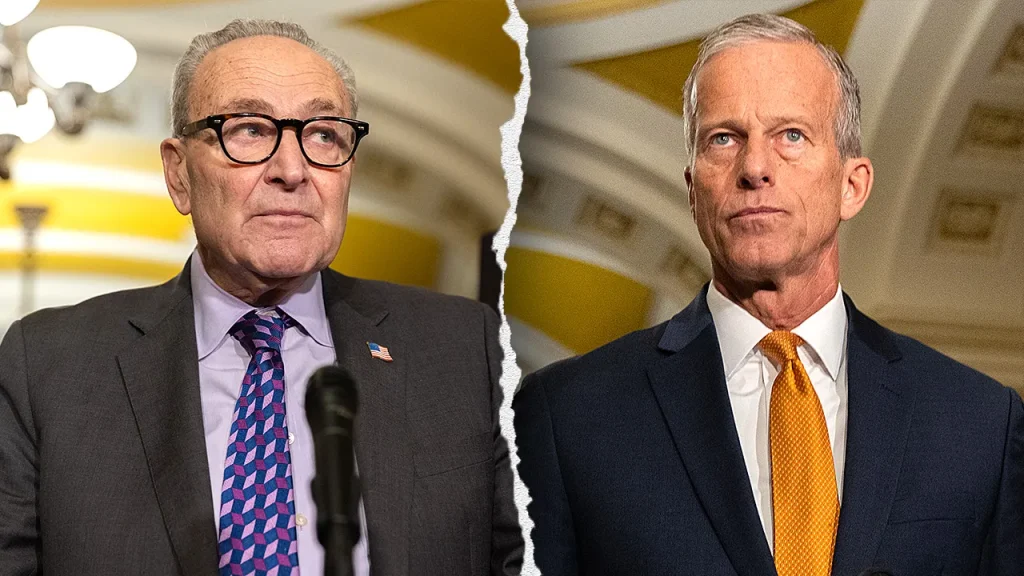Listen to the article
Senate Republicans are seeking Democratic support to break the current government shutdown impasse with a new funding proposal that could come to a vote as early as tomorrow, according to sources familiar with the negotiations.
The proposal would fund the government through January while extending funding for the Department of Agriculture, Department of Veterans Affairs, and Congress itself until September 30, 2026. Republicans believe they may be able to secure the 60 votes needed to break a Senate filibuster if enough Democrats join them.
However, a significant sticking point remains unresolved: the status of Affordable Care Act (Obamacare) subsidies. Democratic lawmakers have expressed strong opposition to the absence of provisions addressing rapidly rising health care premiums, which could affect millions of Americans.
“They’re looking for an off-ramp,” said one Senate source familiar with the Democrats’ thinking, suggesting that some moderate Democrats may be willing to compromise despite pressure from party leadership.
The growing disruption to air travel appears to be a key factor influencing Democratic calculations. With air traffic controllers working without pay, the Federal Aviation Administration has been forced to reduce operations at 40 major airports nationwide, including hubs in Atlanta, Newark, Denver, Chicago, Houston and Los Angeles. The resulting flight cancellations and delays have created mounting pressure to resolve the shutdown.
Senate Republican leadership is proceeding cautiously, reportedly reluctant to force a floor vote without confidence they can secure the necessary Democratic support. One Senate source told Fox News it would be “bad form at this stage” to push forward with a procedural vote that might fail, particularly when Republicans view their proposal as the most viable path out of the shutdown.
Any Democratic defection from Senate Minority Leader Chuck Schumer’s position would represent a significant political shift. Progressives have insisted that health care subsidies must be included in any funding agreement, and Schumer has maintained a united front thus far. A break in Democratic ranks without securing an agreement on health care would mark the first meaningful progress toward reopening shuttered government agencies.
If enough Democrats support the measure, a preliminary vote could occur as soon as Saturday night. While Senate procedural rules typically would delay a final vote until Monday or Tuesday, sources indicate Democrats might expedite the process by yielding back debate time if an agreement materializes.
Should the Senate approve the package, attention would shift to the House of Representatives, where its prospects remain uncertain. The House would not likely consider the legislation until midweek at the earliest, extending the shutdown by several more days at minimum.
The partial government shutdown has now entered its second week, affecting hundreds of thousands of federal workers who remain furloughed or working without pay. Essential services continue to operate, though with increasing strain as the impasse continues.
If both chambers ultimately approve the funding package, government operations would resume—at least temporarily—providing a reprieve while lawmakers negotiate a more permanent solution to the budgetary standoff. However, without addressing the healthcare subsidy issue, the underlying political conflict would remain unresolved, potentially setting up another confrontation when the temporary funding expires in January.
Fact Checker
Verify the accuracy of this article using The Disinformation Commission analysis and real-time sources.




8 Comments
This is a complex issue with implications across multiple sectors, including mining, energy, and healthcare. I hope the lawmakers can find a way to address the immediate concerns while also laying the groundwork for more comprehensive solutions in the future.
The Democrats’ stance on the Obamacare subsidies is understandable, but I wonder if there’s room for compromise. Perhaps a temporary extension or a commitment to address the issue in the coming months could help break the deadlock. Curious to see how the negotiations unfold.
The air travel disruption does seem to be a significant factor in the Democrats’ calculations. Hopefully, they can find a way to address the rising healthcare costs while also keeping the government running. A temporary funding extension could provide some breathing room for further negotiations.
I appreciate the Republicans’ effort to find a compromise, but the Obamacare subsidy issue is a significant hurdle. Protecting access to affordable healthcare should be a priority, even in the midst of a government funding dispute. Curious to see how this plays out.
Interesting to see the House considering a procedural vote on an interim spending bill. Seems like a potential compromise is on the horizon, though the Obamacare subsidy issue remains a sticking point. I’m curious to see if moderate Democrats can help break the gridlock.
This seems like a delicate balancing act for both parties. While the air travel disruption is a pressing concern, the long-term implications of the Obamacare subsidy issue shouldn’t be overlooked. Hoping for a pragmatic solution that addresses the immediate needs while laying the groundwork for more comprehensive reforms.
The mining and energy sectors will be closely monitoring the outcome of this vote, as regulatory and permitting processes can be significantly impacted by a prolonged government shutdown. Stability and certainty are crucial for these industries to thrive.
The mining and commodities sectors will be closely watching this development, as any prolonged government shutdown could impact regulatory and permitting processes. It’s important for lawmakers to find a resolution that provides stability and certainty for these industries.